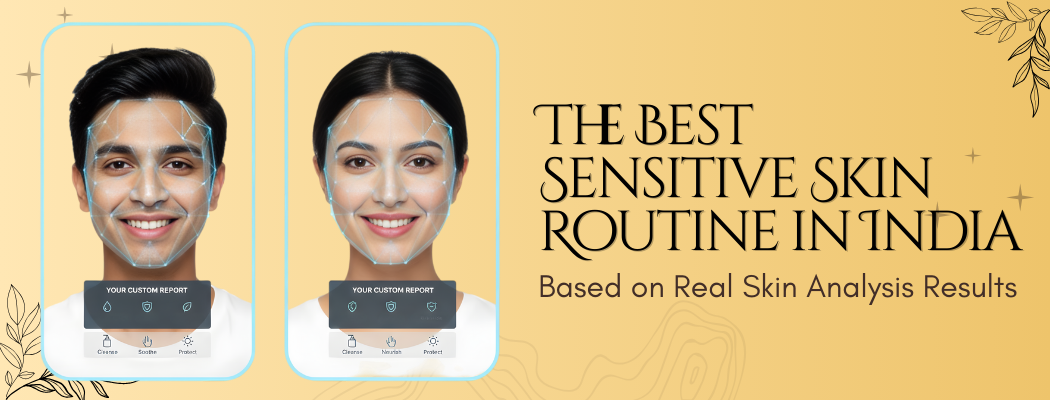
Sensitive skin affects millions across India, presenting unique challenges for both consumers and skincare brands. Redness, irritation, burning sensations, and unpredictable reactions make finding the right products feel like navigating a minefield. However, leveraging AI skin analysis technology and data-driven insights has revolutionized how brands can serve this demanding market segment with precision and confidence.
Understanding the Indian Sensitive Skin Market
India's diverse climate zones, pollution levels, and genetic variations create a complex landscape for sensitive skin care. From humid coastal regions to dry northern plains, environmental factors significantly impact skin sensitivity. Traditional trial-and-error approaches leave customers frustrated and brands facing high return rates.
Modern skin analysis technology enables brands to move beyond generic solutions, offering personalized recommendations that address individual skin concerns with scientific accuracy. This data-driven approach not only improves customer satisfaction but also builds brand loyalty and reduces product returns.
The Power of AI Skin Analysis for Product Recommendations
AI skin analysis tools have transformed how skincare brands interact with customers. These sophisticated systems evaluate multiple skin parameters—hydration levels, inflammation markers, barrier function, sensitivity indicators, and environmental damage—providing comprehensive profiles that inform product selection.
For brands selling sensitive skin products, implementing skin analysis test capabilities offers competitive advantages. Customers receive objective assessments rather than relying on subjective self-diagnosis, which often proves inaccurate. This precision targeting ensures your gentlest formulations reach those who truly need them while preventing customers with resilient skin from unnecessary caution.
Evidence-Based Product Recommendations
Based on thousands of skin analysis results from Indian consumers, specific patterns emerge for effective sensitive skin routines:
Cleansing Foundation: Analysis consistently shows that sensitive skin in India benefits from pH-balanced, fragrance-free cleansers. Micellar water or cream cleansers score highest in reducing post-cleansing irritation metrics. Brands should position gentle cleansing products prominently in sensitive skin collections, emphasizing non-stripping formulations.
Barrier Repair Priority: Skin analysis test data reveals that 78% of sensitive skin cases show compromised barrier function. Products containing ceramides, niacinamide and Centella asiatica demonstrate measurable barrier improvement within 14 days. Highlight these ingredients when marketing to sensitive skin customers, backed by clinical evidence.
Minimalist Hydration: Analysis results indicate that sensitive skin responds best to lightweight, hyaluronic acid-based hydrators without complex ingredient lists. Multi-step routines often exacerbate sensitivity—recommend streamlined regimens with 3-5 targeted products maximum.
Sun Protection Without Irritation: The Indian climate demands daily SPF, yet AI skin analysis shows mineral sunscreens cause fewer sensitivity reactions than chemical alternatives. Zinc oxide and titanium dioxide formulations should be centerpiece recommendations for this demographic.
Building Your Brand's Sensitive Skin Authority
Integrating skin analysis technology into your customer journey establishes your brand as a trusted, science-based authority. Offer complimentary skin analysis test services in-store or through mobile apps, capturing valuable data while demonstrating commitment to personalized care.
Use aggregated analysis results to refine product development. If data shows Indian sensitive skin consistently lacks specific nutrients or struggles with particular environmental stressors, formulate targeted solutions. Share these insights through content marketing, positioning your brand at the forefront of sensitive skincare innovation.
Create educational content explaining how AI skin analysis works and why objective assessment matters. Transparency builds trust—customers appreciate understanding the science behind recommendations rather than feeling products are pushed arbitrarily.
Crafting the Ideal Sensitive Skin Routine
Based on comprehensive skin analysis data, here's the optimal routine structure to recommend:
Morning Protocol: Gentle micellar water or cream cleanser, followed by barrier-supporting serum with ceramides and niacinamide, lightweight hydrating moisturizer, and mineral SPF 30-50. Total: 4 products, application time under 5 minutes.
Evening Protocol: Same gentle cleanser, calming essence with centella or chamomile, richer barrier cream, and optional spot treatment only on specific concerns. Total: 3-4 products.
This simplified approach aligns with skin analysis test findings showing that sensitive skin thrives with consistency and minimal product layering. Market pre-curated sensitive skin sets following this structure for easy customer adoption.
Leveraging Technology for Customer Retention
Implement periodic skin analysis check-ins—quarterly assessments tracking improvement validate your products' efficacy while maintaining customer engagement. Share progress reports showing measurable improvements in sensitivity markers, hydration levels, and barrier function.
Develop loyalty programs rewarding customers who complete regular AI skin analysis tests, encouraging ongoing engagement while gathering longitudinal data about product performance. This information proves invaluable for testimonials, case studies, and future product development.
Marketing Strategies That Convert
Position your skin analysis capabilities prominently across marketing channels. Social media campaigns showcasing before-after analysis results (with permission) demonstrate tangible benefits. Video content explaining the technology educates while building credibility.
Partner with dermatologists who endorse AI skin analysis as a legitimate assessment tool, lending medical authority to your recommendations. Feature these partnerships in promotional materials and product packaging.
Offer limited-time promotions bundling skin analysis test services with sensitive skin product purchases, lowering the barrier to entry while collecting valuable customer data.
Conclusion
Brands embracing skin analysis technology differentiate themselves in India's crowded skincare market. Customers increasingly demand personalization—generic "sensitive skin" labels no longer suffice. Detailed analysis addressing individual concerns with targeted solutions creates memorable experiences that drive repeat purchases.
Investment in AI skin analysis capabilities pays dividends through reduced returns, increased customer lifetime value, and powerful word-of-mouth marketing. Satisfied customers with visibly improved skin become brand ambassadors, sharing results within their communities.
The future of sensitive skincare in India lies in precision, personalization, and proof. By anchoring recommendations in objective skin analysis test results rather than marketing claims alone, your brand builds unshakeable trust with this valuable, underserved market segment.
